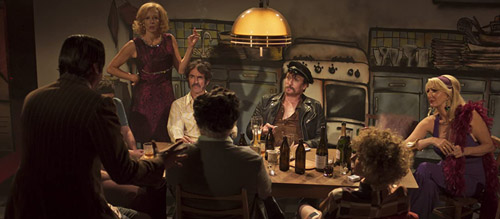Enfant Terrible (2021) Review
Enfant Terrible (2021)
Director: Oskar Roehler
Screenwriters: Klaus Richter, Oskar Roehler
Starring: Oliver Masucci, Hary Prinz, Katja Riemann, Felix Hellmann, Anton Rattinger, Erdal Yildiz, Markus Hering, Michael Klammer
Many biopics will go for a glamorised Hollywood treatment (especially for Hollywood idols and icons) to try and make someone seem more important, more conventionally cinematic – look to films like Bohemian Rhapsody for more details. It makes Enfant Terrible all the more refreshing then, as it takes an art-house approach for an art-house director, refusing to be led down this path and forging its own unique identity. Following the life of director Rainer Werner Fassbinder, cult-hero and madman, Roehler’s neon-drenched drama is a relentless assault on the eyes and ears as it chronicles his rise, his depravity, his madness, and eventually his final end.
The decision to film every scene on a sound stage is a bold and interesting idea. Paralleling the radical filmmaker’s work in theatre, where we first meet Fassbinder, most appliances, doors, and even white goods, are painted onto the walls. It takes the attention away from whatever’s outside, away from the sheen of the cooker, and brings it onto the performances, especially Masucci’s take on Fassbinder, which is a phenomenon to behold. He must control everything; there is no room for any reality which is not his.
With all the focus on the reckless, headlong charge of Fassbinder’s scorn and hatred for anyone who doesn’t fall in line, the film uses every trick it can to make you feel like one of his associates; dragged through mud backwards in his wake. Gone are the conventional establishing shots that usually give us a second to gather our thoughts from the previous scene and prepare for the one upcoming, and in comes the neon, soaking every frame until it’s sopping. This isn’t Blade Runner 2049, Roger Deakins neon; this is a filthy neon, as dirty as Fassbinder himself. Gone are the wide-open spaces of the real world, and in come the dark, claustrophobic sets of the stage. This kind of stylised approach makes you feel like you can never get comfortable, that this world is not one you’re used to. It is his world. Indeed, it may take some viewers a little time to adjust; it’s certainly one of a kind.
You never get a break with Enfant Terrible, even in somewhat quieter moments. Fassbinder never relents for a moment from his egotistical, destructive ways, and just as he was so productive in life, the film squeezes so much into such a short space of time, you wonder if you might have actually seen several films. It bludgeons you to death with sheer quantity of film and anger and sexuality and violence, running through over a decade of diamonds and decadence with the speed and power of a runaway freight-train.
That everything mirrors and embodies Fassbinder (or at the very least, this film’s Fassbinder) in some way is apparent, but the film runs the risk of becoming as cold and heartless as he is. It rushes through its story so fast that it’s hard to know what the film feels about this individual, flopping from praising him to scorning his behaviour within minutes. Masucci’s Fassbinder probably wouldn’t give a damn what we think of him, and maybe that’s the point. Maybe the film doesn’t care what it thinks of him, either. What is for certain is that Enfant Terrible is relentless, unforgiving, and emotionally draining. It is unrestrained and raw. It is power in 135 minutes, teetering on the edge of tearing itself to pieces in the act.
Most importantly, it just about manages to hold on to some semblance of sanity. Just.
18/24


